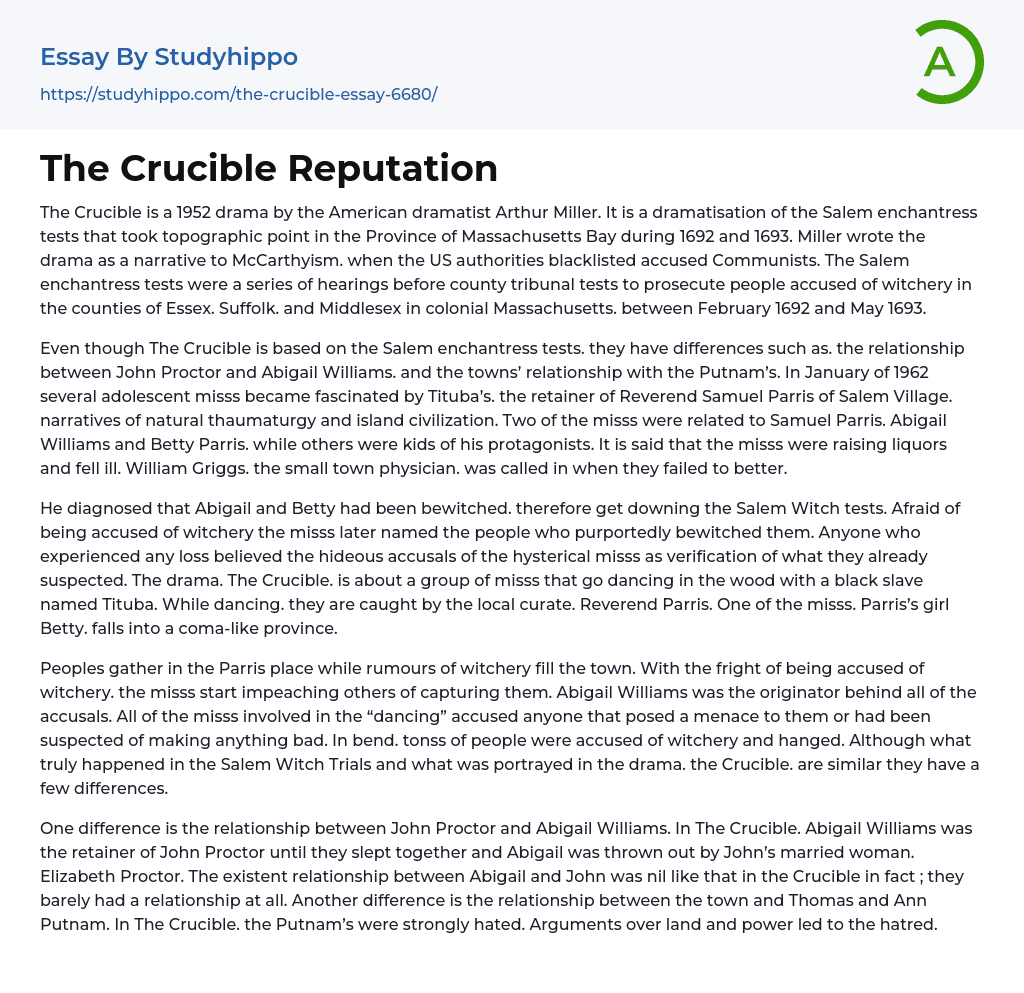"The Crucible" by Arthur Miller, a 1952 drama, serves as an allegory to McCarthyism, the period of government blacklisting in which accused Communists were targeted. It depicts the Salem witch trials that occurred in Massachusetts Bay from 1692 to 1693. While based on true events, the play deviates from them in various aspects, including John Proctor's relationship with Abigail Williams and the interactions between the town and the Putnams.
In January 1962, a group of teenage girls (including Abigail Williams and Betty Parris, who were related to Reverend Samuel Parris) became fascinated by Tituba's stories about natural magic and island culture. These girls claimed to be bewitched and fell ill. The town's physician diagnosed them with bewitchment, sparking the beginning of the Salem Witch trials. To avoid being accused themselves, these girls later identified others as alleged witches.
The te
...xt discusses how "The Crucible" revolves around a group of girls caught dancing in the woods with Tituba, an enslaved black woman. One girl named Betty falls into a comatose state, causing rumors about witchcraft to spread throughout town. Fearing accusations against themselves, these girls begin accusing others of witchcraft; Abigail Williams emerges as their primary instigator.
Numerous individuals were accused and executed through hanging in the Salem Witch Trials, a historical event depicted in "The Crucible." However, there are some differences between the two.
In "The Crucible" play, the character Abigail Williams used to be employed by John Proctor but was dismissed by his wife after their affair was discovered. However, in reality, their relationship was not as depicted and they barely had any connection at all. Another contrast is the strained relationship between Thomas and Ann Putnam and
the townspeople. The play suggests that the Putnam family faced significant hostility due to disputes over land and power. Nevertheless, their actual relationship was not as negative. While there was still some dislike towards them from the town's residents, it wasn't as intense as portrayed in the drama.
Despite these differences, both "The Crucible" play and historical events share a common foundation. Presently, such incidents would never occur since individuals are no longer executed for witchcraft in America; it is no longer considered such a serious crime. Even though minimal evidence existed against those accused during that time period, they were still executed back then. Nowadays, this kind of scenario would never unfold due to America's more rational and fair justice system which aims to prevent false testimonies exaggerated by young children for dramatic purposes
- Attitude essays
- Goals essays
- Personal Goals essays
- Personal Life essays
- Personality essays
- Principles essays
- Reputation essays
- Self Awareness essays
- Self Esteem essays
- Self Reflection essays
- Self Reliance essays
- Strengths essays
- Value essays
- Values essays
- Weakness essays
- Who Am I essays
- Abolitionism essays
- Adam Smith essays
- American History essays
- American Revolution essays
- Ancient Egypt essays
- Articles Of Confederation essays
- Atlantic Slave Trade essays
- Aztec essays
- Benjamin Franklin essays
- Civil Rights Act of 1964 essays
- Civil Rights Movement essays
- Civil war essays
- Cleopatra essays
- French And Indian War essays
- Gettysburg essays
- Great Depression essays
- Hurricane Katrina essays
- Industrial Revolution essays
- Jamestown essays
- Manifest Destiny essays
- Mccarthyism essays
- Patrick Henry essays
- Pearl Harbor essays
- Pocahontas essays
- Prohibition essays
- Pyramids essays
- Salem Witch Trials essays
- Slavery essays
- The New Deal essays
- Thirteen Colonies essays
- Westward Expansion essays
- 1984 essays
- A Farewell to Arms essays
- A Good Man Is Hard to Find essays




